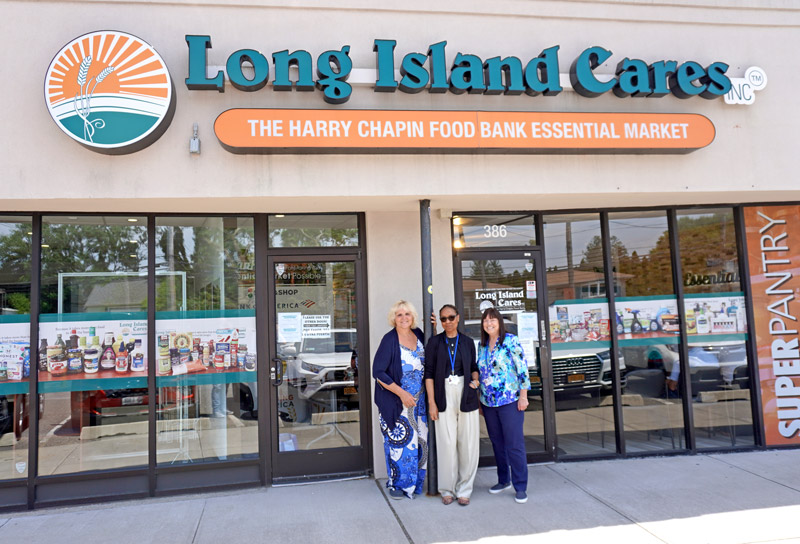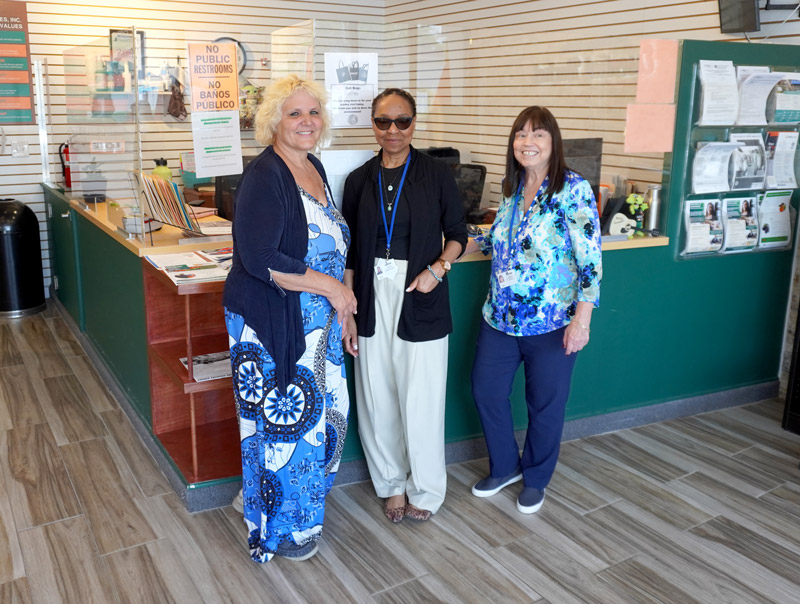CEC Health Care operates a Community Mental Health Promotion and Support (COMHPS) team that provides emotional support, wellness activities, screenings, and referrals to treatment in Western Nassau County. A multi-disciplinary team of licensed mental health professionals and paraprofessionals seeks to engage the general public in mental health wellness activities by providing information and resource tables, conducting small groups and classes, and having individual meetings in person or by phone to discuss mental health concerns and available resources.

Pictured Left to Right: COMHPS Team Members
Carolyn Tynan, Debra Soon and Team Leader Jeanne Morrison
COMHPS is the successor program to Project Hope. During COVID, CEC Health Care participated in Project Hope, a FEMA-funded program that provided crisis counseling and referrals to mental health treatment to assist the general public in managing the stress of the pandemic. The CEC Project Hope Team was present at a COVID vaccination site, conducted both virtual and in person wellness groups, and provided a high volume of individual sessions by phone to provide crisis counseling and support.
Older persons struggled during the pandemic, with isolation being the prominent issue. Family members feared becoming ill themselves or feared transmitting COVID to the older members of their family. Due to the lack of healthy outlets during the COVID lockdowns, family members became less patient with each other, and tensions arose. Seniors contacted the Project Hope staff, expressing feelings of anxiety, vulnerability, and helplessness. The team also provided grief counseling when loved ones were lost to COVID.
At the end of 2022, as the COVID pandemic dissipated, FEMA ended the funding for Project Hope. The New York State Office of Mental Health then decided to use the lessons learned from Project Hope to develop a new program model called Community Mental Health Promotion and Support (COMHPS). COMHPS retained the community engagement model of Project Hope but changed the focus from pandemic-related crisis counseling to promoting mental health wellness and resiliency. COMHPS also utilizes concepts from the substance use “Prevention” programs operated by NYS OASAS.
Based on its success with Project Hope, CEC Health Care was awarded a COMHPS team for Western Nassau County. Several of the former CEC Project Hope staff, including the leadership, were retained by the agency to work in the new COMHPS program.
The team regularly attends health fairs, community festivals, senior centers, assisted living, nursing homes, libraries, food pantries, soup kitchens, farmers markets, veterans’ organizations, and schools. The teams will provide information and resource tables, conduct small groups and workshops, and provide individual support via phone and text. Staff are also trained to recognize and respond to severe emotional distress and suicidality and to take appropriate action as needed.
The COMHPS team has also been trained to utilize a standardized screening tool. The tool helps shape the conversation when an individual is seeking assistance. Frequently, individuals initially approach the COMHPS team with questions about concrete issues (i.e., benefits, housing, insurance, etc.), but if a behavioral health concern is discovered later in the encounter, the team uses the tool to screen for various mental health issues (including suicidality); the team will also assist the individual in being referred and accessing the appropriate service.
In 2023, the CEC COMHPS team encountered over 7,200 individuals at tabling events, provided in person classes and individual support to over 9,100 individuals, and served over 1,900 persons via phone or text.
The CEC COMHPS team has successfully encountered and engaged older adults in senior centers, nursing homes, assisted living, and libraries. Seniors served by the COMHPS team often experience isolation because younger family members have moved away or are reluctant to share their feelings with their families.
Some seniors struggle with how much the world has changed since they were younger, especially regarding technology. One concerning theme is that seniors are becoming more and more fearful about being the victim of violence. Another theme is that seniors fear a loss of control, such as being unable to drive, not being able to shop for themselves, and an inability to care for their personal needs. Questions and concerns about developing Alzheimer’s and Dementia are also frequently raised.
Staff report that older persons seek conversations surrounding grief and loss; COMHPS often utilizes the “stages of grief” in groups conducted at senior centers. Anniversaries, particularly the anniversary of the death of a spouse, are particularly painful.
Older persons welcome the opportunity to express themselves and receive support in group and individual settings. They report that contact with others by phone or video is not as satisfying as in person contact. One activity conducted by the COMHPS team involves groups where older persons share “life lessons” with younger individuals. This fosters a greater sense of community.

Pictured Left to Right: COMHPS Team Members
Carolyn Tynan, Debra Soon and Team Leader Jeanne Morrison
An inflection point for many older persons is when they first retire from the workforce. One’s identity is often tied to their work, and the ending of their career can result in a loss of that identity. The COMHPS team seeks to assist seniors to stay active and to develop a new sense of purpose.
The COMHPS team uses a variety of modalities to engage seniors and the general public. Crafts, art activities, and memory games serve as icebreakers and conversation starters for group activities. One activity utilized by the COMHPS team with seniors involves “reconciling the past,” where seniors come to grips with it and learn to “let go” of past hurts.
The Western section of Nassau County is becoming increasingly diverse with a growing Hispanic population. Many COMHPS staff are bilingual in Spanish and try engaging Spanish-speaking seniors in various settings.
As part of serving older persons, the CEC COMHPS team has also successfully engaged older veterans, particularly Vietnam veterans in their mid to late 70’s. COMHPS has one staff member who is an Iraq veteran and another who directed the Nassau County VET Center; both are highly skilled in assisting veterans.
The COMHPS team meets with veterans at the Nassau County Veteran Service Agency, in libraries, at Veterans Food Pantries, and at various veterans’ events.
Older veterans express a fear of being forgotten, and the low attendance at veterans’ parades and events is particularly upsetting. They also express concerns that the newer generation of veterans will not receive their due recognition. Seeing scenes of wars in the Ukraine and Gaza is also triggering for these veterans. The COMHPS team allows veterans to express their feelings and encourages them to look out for each other through peer support.
The CEC COMHPS team recently participated in a Veterans Conference on Long Island. At the conference, COMHPS assisted one of their clients, a 102-year-old female veteran who was a nurse in World War II, in speaking on a conference panel about her experiences. She spoke about how her hospital unit followed the front lines as it traveled throughout Sicily and Italy, and she spoke lovingly of the care she provided to young and wounded soldiers.
It should also be mentioned that in addition to their work with seniors and veterans, the CEC COMHPS team has done a tremendous amount of work in school districts to increase mental health awareness among youth. The team has also been heavily engaged in providing workshops to migrant youth who may have experienced trauma in their home country and during their journey. These workshops are conducted in Spanish. During these sessions, one of the COMHPS team members, who had immigrated to the US himself, shared his journey as an inspiration.
The COMHPS model has been successful in reaching out to individuals with various levels of mental health issues by being present in natural community settings. The program helps enrich the lives of seniors, veterans, and young migrants. As the program grows and develops, the requests for such services have increased.
John Javis is Operation Director and Jeanne Morrison, LMSW, is COMHPS Team Leader at CEC Health Care.
For more information on the CEC Health Care COMHPS Team, you may call (516) 622-8888 ext. 4110 or emailhttps://charlesevanscenter.org/about/ Jeanne Morrison at morrisonj@charlesevanscenter.org. The agency’s website is www.charlesevanscenter.org.







